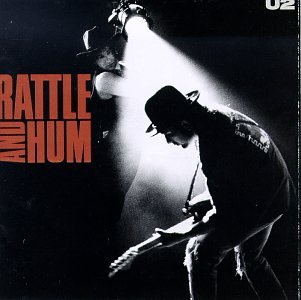
Over the next six weeks we will experience the Christian journey through the words of scripture and the music of U2. Colossians 1:15-20 is an appropriate place to start because it’s a song, at least, most scholars think this is an early hymn about Christ. This song orients a cosmic context for the work of Christ, bringing us back to the beginning of creation itself.
“He is the image of the invisible God, the firstborn of all creation . . .”
Christ is not made in the image of God. Christ is the image of God. As Genesis 1 says, “In the beginning, when God created the heavens and the earth, the earth was a formless void, and darkness covered the face of the deep, while a wind from God swept across the face of the waters. Then God said, “Let there be light!” The vehicle through which God created was the Word. God did not snap his fingers or clap his hands; rather God spoke light into being. We talk about Christ being the Word made flesh. This word of life, of possibility, this word that permits things to be is what took on flesh and walked among us, showing us who God is.
And this makes perfect sense to the theoretical physicist. Did you know there is a theory called Superstring Theory which basically states that all matter is the result of the vibration of tiny strings? The difference between a tree and a car and a baby and a mountain is vibration. So God speaking creation into existence makes perfect sense to those studying the edges of science. Isn’t that incredible? It’s as if when God looks at the world, God is looking at a symphony, a symphony which began with the word, a symphony which grew in strength and beauty to the point that death was defeated in the Resurrection, a symphony still being played today in which we are called to make beautiful music.
Music is such a powerful tool in the church. Fill in the blank. “Amazing Grace how . . .” “Hark the Herald Angels sing, glory to . . .” Music helps us communicate theology, memorize scripture, gather a community, heal wounds . . . It helps us communicate theology. “Hark the Herald Angels Sing” is one of most theologically rich songs sung across denominational lines, and I am proud to say that it is a Charles Wesley hymn. The second verse sings, “Christ, by highest heaven adored, Christ the everlasting Lord; late in time behold him come, offspring of a virgin’s womb. Veiled in flesh the Godhead see; hail the incarnate Deity, pleased with us in flesh to dwell, Jesus, our Emmanuel. Hark the herald angels sing, glory to the newborn king.” Music helps us memorize scripture. Can you recite Psalm 91? Maybe not. Can you sing “On Eagle’s Wings?” Music brings us together. It heals our wounds. . . . but this is music at its best. The symphony of God has not always been a joyful tune.
Let there be light, and there was light, and it was good. When creation comes to a relative close, God proclaims the understatement of the millennium, “It was very good.” Soon thereafter humanity turns its back on God and prefers the self over what God provides. We eat from the tree of the knowledge of good and evil because we decide that trusting ourselves is preferable to trusting God. The beautiful song God composed is now a lament as God fashions clothing for these new garden exiles. This lament is the same tune God sings when his people are in captivity in Egypt, in exile in Babylon, and while Christ hangs on the cross. Of course, it’s not all sorrowful. God sings a joyful song when he gives Moses the stone tablets, this law that reveals how God desires us to live as a community. God sings praise in the holies of holies of the newly constructed Temple. Gods shouts to the heavens when his people return from exile to once again worship him in Jerusalem. God cries a song of hope when Jesus is born, and creation begins to tremble, because for thousands of years, the cosmos has been groaning, waiting, for God’s definitive mark on all that is.
Colossians 1:16 says, “For in him all things in heaven and earth were created, things visible and invisible, whether thrones or dominions or rules or powers—all things have been created through him and for him.” Creation was in Christ, through Christ, and for Christ—all creation, the visible and invisible and thrones, dominions, rulers, and powers. Creation is in Christ and through Christ. Proverbs 8 (beginning with verse 22) tells this story beautifully:
The Lord created me at the beginning of his work,
The first of his acts of long ago
Ages ago I was set up,
At the first, before the beginning of the earth.
When there were no depths I was brought forth
When there were no springs abounding with water.
Before the mountains had been shaped,
Before the hills, I was brought forth
When he had not yet made earth and fields
Or the world’s first bits of soil
When he established the heavens, I was there
When he drew a circle on the face of the deep
When he made firm the skies above
When he established the foundations of the deep
When he assigned to the sea its limit
So that the waters might not transgress his command
When he marked out the foundations of the earth
Then I was beside him, like a master worker
And I was daily his delight
Rejoicing before him always
Rejoicing in his inhabited world
And delighting in the human race.
And now, my children, listen to me:
Happy are those who keep my ways
Hear instruction and be wise, and do not neglect it.
Happy is the one who listens to me,
Watching daily at my gates, waiting beside my doors
For whoever finds me finds life
And obtains favor from the Lord
But those who miss me injure themselves;
All who hate me love death
“Pride—In the Name of Love” is a simple song, much like “In Christ, through Christ, for Christ,” is a simple saying, yet both are heavy and full of meaning. There’s one line in particular that intrigues me. “One man betrayed with a kiss.” Does this mean that one man was betrayed with a kiss in the name of love? Does it mean that one man did betray with a kiss in the name of love? It’s a simple line, but it sends the mind spinning. The moment Christ was betrayed, God’s creation song finds a minor key and it sounds like the song is going to end in sorrow. But just when we think the baton is going to drop, the stone is rolled away and Christ is resurrected and the song becomes joyful, playing a melody as beautiful and when God first spoke life into existence.
Here is the mystery. Creation is in Christ, through Christ, and for Christ. This hymn from Colossians suggests that creation didn’t end on the sixth day or the seventh day; rather resurrection was the exclamation point on God’s masterpiece. Now, for a moment, I’m going to ask you to use your holy imagination. Imagine observing creation. Each day you see something new, something that has never been: light, the waters above and below, the earth, the sun and moon and stars, creatures of the sea and land and then humanity. On this sixth day: “God saw everything that he had made, and indeed, it was very good.” Now before the sun sets on the sixth day, imagine the whole of Israel’s story taking place: The covenant with Abraham, Egyptian captivity, the Law with Moses, Joshua and the Promised Land, David and Solomon and the Temple, the Babylonian captivity, the restoration of the Temple, Roman occupation, the birth and life of Jesus, the word made flesh. Now imagine “one man betrayed with a kiss,” and Jesus is hung on the cross, saying, “It is finished!” His friends take his body, and place it in a garden tomb . . . there was an evening and there was a morning, the sixth day. Thus the heavens and the earth were finished, and all their multitude. And on the seventh day God finished the work that he had done and he rested [in the tomb]. On the first day of the week, before the sun had risen, the stone was rolled away, and Christ was alive!
This creation story, God’s love story with humanity, spans thousands of years. It is a story which began in Christ. It was revealed to us through Christ. It was all done for Christ, so that we, with Christ, might know the love that God has for us. It was all done in the name of love, through love, and for love so that we might live as resurrection people, embodying God’s ultimate purpose of creation. Praise Be To God. Amen.



















